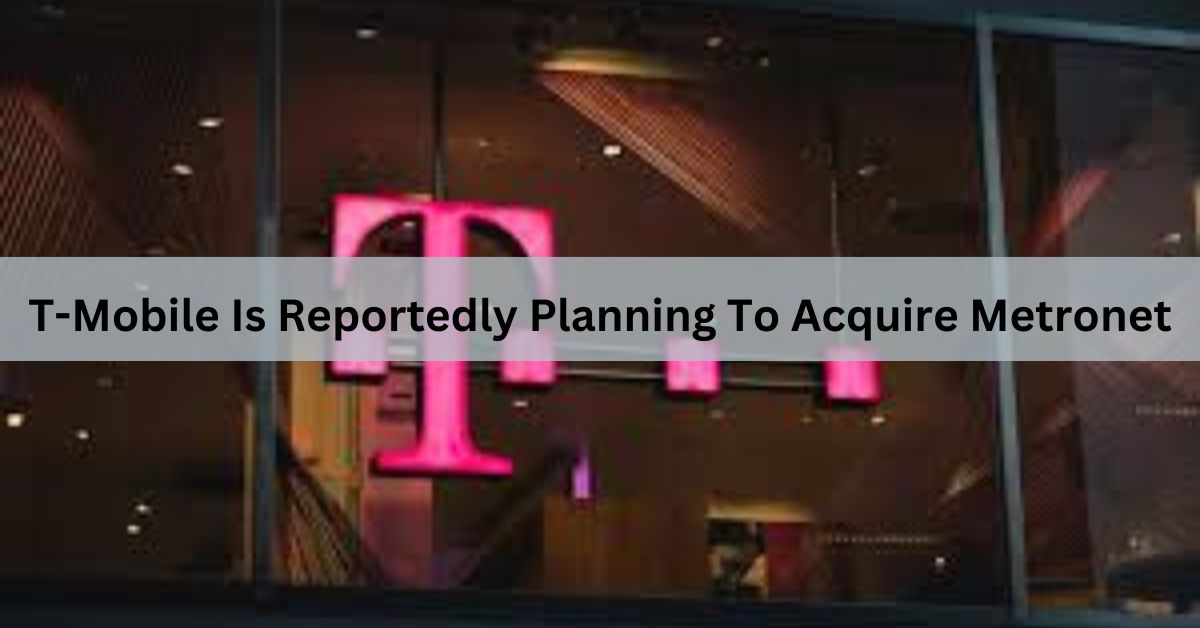T-Mobile is reportedly eyeing the acquisition of Metronet, a high-speed fiber-optic internet provider, in a move that could shake up the telecom industry. This potential deal may enhance T-Mobile’s broadband offerings and expand its reach, particularly in underserved areas, while intensifying competition in the high-speed internet market.
T-Mobile is said to be planning to buy MetroNet, a company that provides internet services. This move could help T-Mobile grow its network and offer faster internet to more people. The deal would strengthen T-Mobile’s position in the internet market, giving it a wider reach and more customers.
In this article,we will discuss “Mobile Is Reportedly Planning To Acquire Metronet”
Table of Contents
What is T-Mobile?
T-Mobile has been a powerhouse in the U.S. telecom industry for decades. Known for its “Un-carrier” approach, T-Mobile has consistently aimed to simplify and improve mobile service for consumers.
By offering no-contract plans, unlimited data, and aggressive 5G expansion, T-Mobile has carved out a substantial share of the market.
Who is Metronet?
Founded to bring high-speed fibre-optic internet to communities that lack reliable connectivity, Metronet has grown into a trusted provider for many rural and suburban customers.
Their emphasis on providing high-quality internet, especially in underserved regions, makes them an appealing partner for a larger telecom like T-Mobile.
Why T-Mobile is Interested in Acquiring Metronet?
For T-Mobile, acquiring Metronet could offer significant advantages. T-Mobile has focused primarily on mobile services but has recently expanded into home internet through 5G technology.
Metronet’s fibre-optic infrastructure could enable T-Mobile to serve both mobile and home internet customers more effectively, especially in areas where T-Mobile’s current coverage is limited.
The State of the Telecom Industry:
The telecom industry has seen significant changes in recent years, with major players like AT&T, Verizon, and Comcast constantly competing for dominance.
In a landscape where high-speed internet is increasingly essential, telecom companies have expanded into new territories, prompting many mergers and acquisitions. This potential acquisition between T-Mobile and Metronet follows a similar trend.
Impact on Consumers:
For consumers, this acquisition could lead to improved internet and mobile service, as well as more competitive pricing options.
T-Mobile may leverage Metronet’s infrastructure to offer bundled packages, making it easier and potentially more affordable for customers to get both mobile and high-speed internet services in one place.
Potential Benefits of the Acquisition for T-Mobile
The potential acquisition of Metronet by T-Mobile could bring a multitude of advantages that enhance the company’s position in the competitive telecom landscape.
Read: LibGuides Mobile Banner CSS – A Complete Guide of 2024!
Here are some of the key benefits:
Expanded Infrastructure:
By acquiring Metronet, T-Mobile would gain access to an extensive fiber-optic network. This infrastructure is crucial for delivering high-speed internet services and can complement T-Mobile’s existing mobile network.
With this expanded infrastructure, T-Mobile could ensure better service quality and reliability for both mobile and internet users.
Increased Market Share:
The acquisition would enable T-Mobile to expand its customer base significantly. Metronet’s established presence in various regions, especially in underserved and rural areas, means that T-Mobile could reach customers who may not have access to reliable high-speed internet. This could translate to a larger market share in the broadband space.
Enhanced Service Offerings:
Combining T-Mobile’s mobile services with Metronet’s fiber-optic internet capabilities would allow for the development of new bundled service offerings. Customers could enjoy comprehensive packages that include mobile plans and high-speed internet, providing convenience and potential cost savings.
Strengthened Competitive Position:
As the telecom industry becomes increasingly competitive, having a dual service model (mobile and high-speed internet) could set T-Mobile apart from its rivals. This acquisition would allow T-Mobile to compete more effectively against major players like Verizon and AT&T, who also offer a combination of services.
Boost to 5G Expansion:
The integration of Metronet’s fiber infrastructure would support T-Mobile’s ongoing efforts to expand its 5G network. Fiber-optic lines are essential for delivering the high-speed connectivity required for 5G services.
With improved backhaul capabilities, T-Mobile could enhance its 5G offerings, particularly in rural and underserved areas where high-speed access is currently limited.
Improved Customer Experience:
With a more robust network, T-Mobile can offer customers faster internet speeds and better reliability. This improvement in service quality could lead to higher customer satisfaction and retention rates, which are critical in a competitive market.
Opportunities for Innovation:
Acquiring Metronet could also open doors for innovative service solutions. T-Mobile might explore new technologies or services, such as smart home solutions, Internet of Things (IoT) products, and enhanced customer support options, all leveraging the strengths of both companies.
Read: How To Fix Inbox Locked On Fc Mobile – Fix Inbox Locked FIFA!
Challenges and Risks in the Acquisition Process:
While the acquisition of Metronet by T-Mobile holds significant potential benefits, it also comes with a range of challenges and risks that the company must carefully manage. Here are some key considerations:
Regulatory Scrutiny:
One of the most significant hurdles in any major acquisition is regulatory approval. Given T-Mobile’s size and market presence, this merger is likely to attract scrutiny from federal and state regulators concerned about potential antitrust violations.
T-Mobile will need to demonstrate that the acquisition will not harm competition or lead to higher prices for consumers. This process can be lengthy and complicated, potentially delaying the merger’s finalization.
Integration Challenges:
Successfully integrating Metronet’s operations with T-Mobile’s existing infrastructure will require meticulous planning and execution. This includes aligning different technology systems, operational processes, and corporate cultures.
Misalignment during integration can lead to service disruptions, employee dissatisfaction, and customer frustration.
Customer Retention:
During the transition period, there is a risk that existing Metronet customers may feel uncertain about the changes and decide to switch providers.
T-Mobile will need to communicate effectively with customers to reassure them about the benefits of the merger and retain their loyalty throughout the integration process.
Cultural Differences:
Merging two distinct organizations can result in cultural clashes. T-Mobile and Metronet may have different corporate philosophies, management styles, and employee expectations.
Bridging these cultural differences will be crucial to maintaining morale and productivity among employees, as well as ensuring a smooth transition for customers.
Market Reactions:
Competitors might respond aggressively to the merger announcement. T-Mobile could face increased competition from rivals like Verizon and AT&T, who may intensify their marketing efforts or adjust their service offerings to maintain their market share.
This competitive pressure could impact T-Mobile’s ability to realize the anticipated benefits of the acquisition.
Financial Considerations:
The financial implications of the acquisition can be complex. T-Mobile will need to assess the deal’s cost, including any necessary investments to upgrade Metronet’s infrastructure.
There’s also the risk of overestimating the expected synergies and benefits from the merger, which could affect T-Mobile’s financial performance in the long term.
Technological Integration:
Merging the technological platforms of both companies poses a significant challenge. T-Mobile must ensure that its network can seamlessly integrate with Metronet’s systems. Any technological hiccups during this process could disrupt services and impact customer satisfaction.
Legal Risks:
Beyond regulatory hurdles, there could be other legal challenges arising from the merger. Stakeholders may raise concerns, or competitors might initiate legal actions to block the acquisition. T-Mobile will need to prepare for potential legal battles that could further delay the merger process.
How This Affects the Competition?
This acquisition would put significant pressure on T-Mobile’s competitors. Verizon, AT&T, and Comcast, for example, may need to reconsider their own service offerings and expansion strategies.
By combining mobile and fiber-optic internet services, T-Mobile could offer a package that competes directly with these major players in both arenas.
What It Means for Existing Metronet Customers?
Metronet customers might experience improved service quality as T-Mobile integrates its resources and expertise. There may also be adjustments to current plans and pricing, though these changes will likely be communicated in advance to avoid service interruptions.
What the Acquisition Could Mean for T-Mobile’s 5G Expansion?
Acquiring Metronet’s fiber network could bolster T-Mobile’s 5G network. Fiber is a key component in delivering high-speed 5G services, and Metronet’s infrastructure may allow T-Mobile to enhance its 5G offerings, particularly in rural areas that currently lack robust high-speed internet options.
Potential Impacts on Internet Infrastructure:
This acquisition could be pivotal in expanding the reach of fiber-optic networks across the U.S., furthering the push for accessible, high-speed internet. With T-Mobile’s investment, the infrastructure might see enhancements that benefit both mobile and home internet users.
Financial Aspects of the Acquisition:
While the financial terms of the deal haven’t been disclosed, analysts expect this acquisition to be substantial. Funding sources may include T-Mobile’s cash reserves, along with possible financing from investment partners. Investors will likely be monitoring the impact on T-Mobile’s balance sheet and stock performance.
What Industry Experts Are Saying:
Industry analysts are speculating that this acquisition could mark a shift in how telecom companies operate. By blending fiber-optic internet with mobile services, T-Mobile could set a precedent for more integrated service offerings, which might inspire similar mergers across the industry.
Is Metronet owned by T-Mobile?
Metronet is not currently owned by T-Mobile. However, there are reports suggesting that T-Mobile is planning to acquire Metronet. Until the acquisition is finalized, Metronet remains an independent company.
Who owns Metronet?
Metronet is owned by its private equity investors, primarily by a firm called Iris Capital, along with other investors. The company operates as an independent provider of fiber-optic internet services, focusing on delivering high-speed internet to various regions.
What companies did T-Mobile buy out?
Here are some key companies that T-Mobile has bought out:
Sprint (2020):
T-Mobile merged with Sprint to create a larger telecommunications provider, expanding their network and customer base.
MetroPCS (2013):
This acquisition helped T-Mobile grow its prepaid services and reach more budget-conscious customers.
Voicestream (2001):
T-Mobile USA was formed when Deutsche Telekom acquired Voicestream, which was a significant entry into the U.S. market.
Cricket Wireless (2014):
Though T-Mobile didn’t acquire Cricket directly, they gained customers when AT&T purchased Cricket. T-Mobile later focused on its own prepaid offerings.
Layer3 TV (2017):
Acquiring Layer3 allowed T-Mobile to enter the television market and offer cable-like services through their network.
Sprint’s Boost Mobile (2020):
Following the Sprint merger, T-Mobile took ownership of Boost Mobile to further expand its prepaid offerings.
How many home internet customers does T-Mobile have?
As of 2024, T-Mobile has around 2 million home internet customers. The company has seen significant growth as it expands its 5G network and offers competitive pricing for its services, appealing to many households seeking alternatives to traditional internet options.
How many devices will T-Mobile Home internet support?
T-Mobile Home Internet can support up to 64 devices on a single network. Since it has multiple networks, you could connect around 768 devices in total. However, having too many devices connected at once might slow down your internet speed.
FAQ’s:
What is T-Mobile’s interest in acquiring Metronet?
T-Mobile aims to expand its broadband offerings by utilizing Metronet’s fiber-optic infrastructure, especially in underserved areas.
How would the acquisition affect Metronet customers?
Metronet customers might see improved service quality and could benefit from bundled packages combining mobile and high-speed internet.
What challenges could T-Mobile face in acquiring Metronet?
T-Mobile may face regulatory scrutiny, integration issues, and competitive reactions from other major telecom providers.
How many devices does T-Mobile Home Internet support?
T-Mobile Home Internet can support up to 64 devices per network, though heavy usage might impact speed.
Who currently owns Metronet?
Metronet is owned by private equity investors, primarily Iris Capital, but is not yet owned by T-Mobile.
Conclusion:
In summary, T-Mobile’s potential acquisition of Metronet could bring faster internet to more places, improve service options, and strengthen T-Mobile’s market presence. While it offers many benefits, such as reaching underserved areas, T-Mobile may face challenges with regulatory approvals and combining company operations smoothly for the best customer experience.
I’m Arlo Liam, and I bring over 10 years of hands-on experience in the mobile technology field. My journey in mobile technology has been driven by a passion for innovation, usability, and the evolving digital landscape.
From understanding the inner workings of smartphones to exploring emerging trends in mobile software and app development, I am committed to sharing in-depth insights and practical knowledge with users of all levels.



